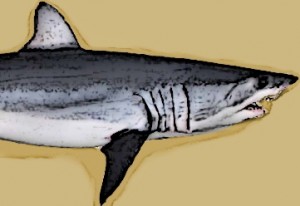EU project to protect threatened sharks
Published by World Fishing & Aquaculture,18. January 2012
 Open-ocean shark populations throughout the world are dropping, not only due to overfishing but also from inadvertent captures by fishermen in search of tuna.
Open-ocean shark populations throughout the world are dropping, not only due to overfishing but also from inadvertent captures by fishermen in search of tuna.
In an effort to protect these vulnerable animals, the MADE project receives €2,980,000 in EU funding and is working to develop ways to reduce their unintentional killing.
Rising international demand for shark fins and livers has imperiled many species worldwide, and, in addition to intentional fishing, certain species of shark are also threatened by becoming bycatch.
In hope of reducing bycatch and easing the pressures on shark populations, the European Commission is supporting the ‘MADE’ project – Mitigating Adverse Ecological Impacts of Open Ocean Fisheries. Launched in 2008, the four-year project is a collective effort of 13 universities and institutes from Belgium, Brazil, France, Greece, Italy, Portugal, Seychelles and Spain. MADE is led by Laurent Dagorn, a Senior Scientist at the Institute of Research for Development, in France.
To develop methods to spare sharks, MADE researchers are combining biological and technological studies with economic analyses at a variety of sites in the Indian and Atlantic oceans. Researchers are currently analysing the data collected and exploring the potential of many options, such as:
- Closing fishing zones at times when sharks are likely to be in the area
- Defining methods to prevent sharks from being caught by hooks, such as an optimal vertical distribution of hooks or using an artificial bait
- Successfully releasing living sharks after they are captured, while ensuring the safety of fishing crews
Around 50 sharks from several species – including blue, silky and oceanic whitetip sharks – have been electronically tagged. This is providing reliable information on sharks’ behaviour and migration, for over 1600 days, that could be used to protect them. MADE researchers are also working in close cooperation with fishermen to develop alternative fishing strategies and new technologies.
According to Mr Dagorn, integrating fishermen knowledge is essential to the project. “We believe that the most effective management measures are developed with the help of the fishermen who are impacted by them,” he said. “So we’re making a great effort to involve fishermen at all stages of our research.”
In the realm of wildlife protection, the effort to save sharks is particularly urgent, as they grow extremely slowly, mature late, and have long pregnancies that produce few offspring.
Source: worldfishing.net
